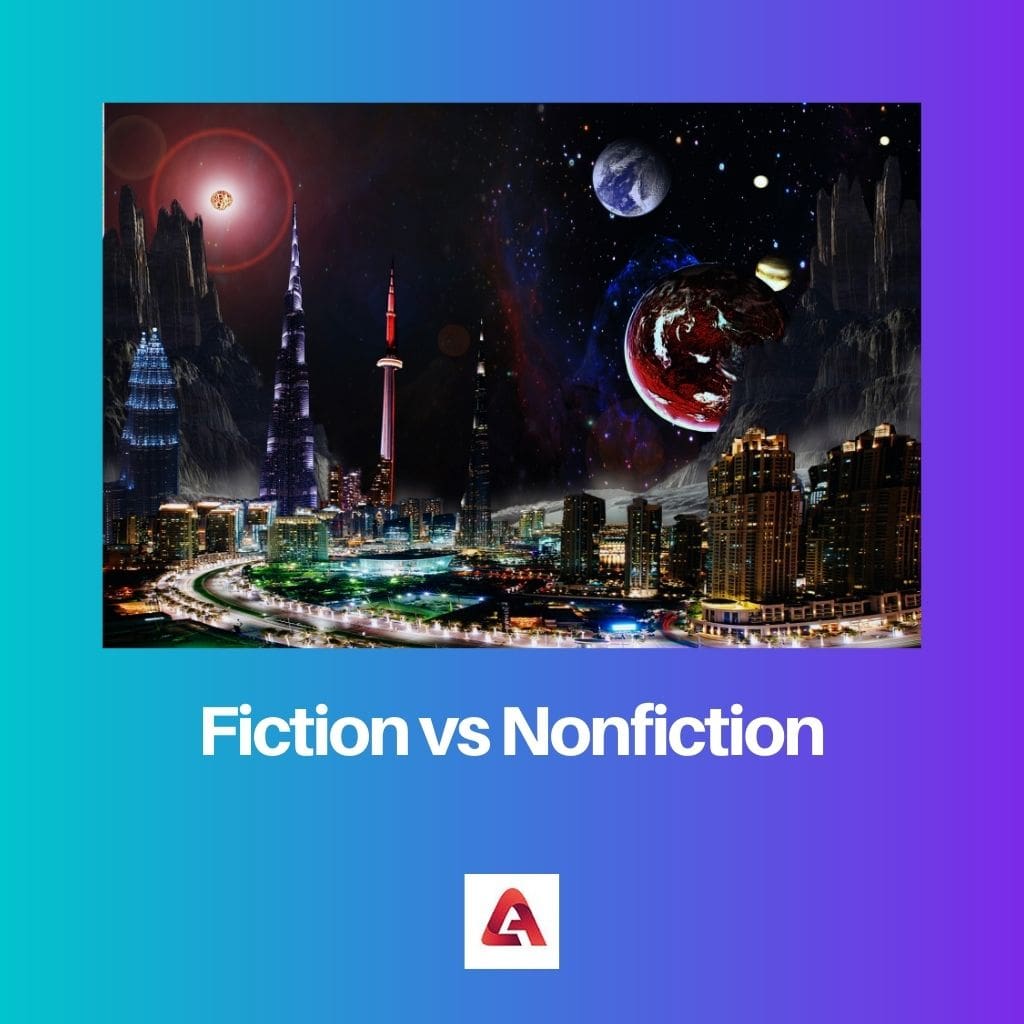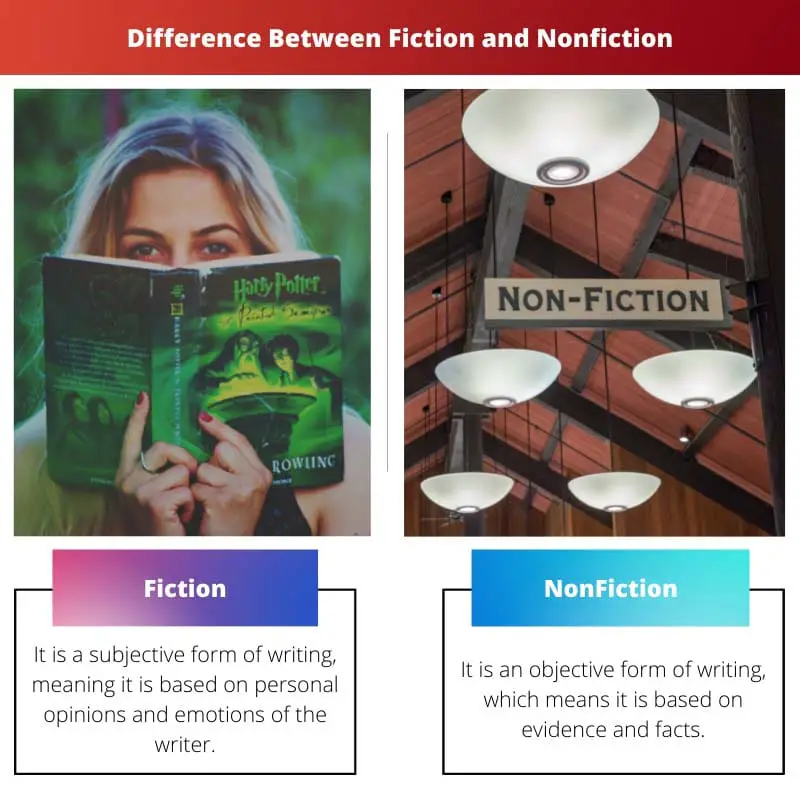“
Fiction transports readers into imaginative realms, weaving narratives crafted from the author’s creativity. It invites exploration of diverse perspectives and emotions through invented characters and events. Nonfiction, on the other hand, delves into the realms of reality, offering factual accounts and analysis that aim to inform, educate, or persuade, grounding readers in truth and verifiable information.
Key Takeaways
- Fiction is a literary genre that involves the creation of imaginary characters, events, or worlds; nonfiction encompasses works based on real events, people, or facts.
- Fiction includes novels, short stories, and other works that explore imagined experiences or situations; nonfiction covers a wide range of topics, such as history, biography, and science, presenting factual information or analysis.
- Both fiction and nonfiction are forms of literature. Still, fiction focuses on storytelling’s imaginative and creative aspects, while nonfiction aims to inform, educate, or persuade readers with accurate information and insights.
Fiction vs Nonfiction
The difference between fiction and nonfiction writing is that the former is based on non-existent and invalid facts, while the latter is based on actual and real-life events.

Fiction is a form of writing in which the author bases their story or article on something imaginative or made up. There is no real-life truth behind it.
Nonfiction is a form of writing where the information conveyed is accurate or based on real-life events. The stories being told here have happened or are based on factual events that have occurred in the past or might occur in the future.
Comparison Table
| Feature | Fiction | Nonfiction |
|---|---|---|
| Purpose | To entertain and engage the reader | To inform and educate the reader |
| Content | Imaginary, created by the author | Factual, based on real events and information |
| Characters | Created by the author | Real people (or those who once lived) or representations of real people |
| Setting | Created by the author, may be real or imaginary | Real or based on real places |
| Plot | Follows a narrative structure with a beginning, middle, and end | May not have a traditional plot structure, but still conveys information in a clear and organized way |
| Structure | Usually read in a linear order | May not need to be read in a specific order, often uses features like indexes and glossaries |
| Examples | Novels, short stories, poems, plays, movies, TV shows | Biographies, textbooks, essays, articles, documentaries |
What is Fiction?
Characteristics of Fiction:
- Imaginative Creation: At the heart of fiction lies the ability to invent, from fantastical worlds with mythical creatures to ordinary settings populated by complex characters. Authors employ their creativity to construct unique environments and scenarios that captivate readers.
- Character Development: Fictional works often center around characters whose journeys, emotions, and interactions drive the narrative forward. Authors delve into the depths of their characters’ personalities, motivations, and conflicts, creating individuals that resonate with readers.
- Narrative Structure: Fictional stories typically follow a structured narrative arc, with elements such as exposition, rising action, climax, and resolution. Authors employ various techniques, such as suspense, foreshadowing, and plot twists, to engage readers and maintain their interest.
- Exploration of Themes: Through fiction, authors explore a wide array of themes, ranging from love and loss to power dynamics and societal issues. These themes serve as the underlying messages or insights that readers derive from the story, often sparking introspection and discussion.
Types of Fiction:
- Literary Fiction: Characterized by its focus on character development, intricate prose, and exploration of complex themes, literary fiction delves into the human condition with depth and nuance.
- Genre Fiction: Genre fiction encompasses various subcategories such as science fiction, fantasy, mystery, romance, and thriller, each distinguished by its unique conventions, settings, and plot elements.
- Historical Fiction: Set in the past, historical fiction blends fictional narratives with real historical events, offering readers a window into different time periods and cultures while exploring universal themes.
- Speculative Fiction: Speculative fiction encompasses stories that imagine alternative worlds or realities, often incorporating elements of science fiction, fantasy, or dystopia to explore philosophical or social concepts.

What is Nonfiction?
Characteristics of Nonfiction:
- Factual Accuracy: Nonfiction works are grounded in truth and accuracy, presenting information that is thoroughly researched, verified, and supported by evidence. Authors rely on credible sources, data, and expert opinions to provide readers with reliable information.
- Informative Content: Nonfiction literature serves to educate, inform, and enlighten readers about a wide range of subjects, including history, science, politics, biography, self-help, and more. It offers insights, explanations, and analyses that deepen readers’ understanding of various topics.
- Perspective and Interpretation: While nonfiction strives for factual accuracy, authors often bring their perspectives, interpretations, and biases to the subjects they explore. Readers are encouraged to critically evaluate the information presented and consider multiple viewpoints.
- Diverse Formats: Nonfiction literature encompasses a diverse range of formats, including essays, articles, memoirs, biographies, documentaries, textbooks, and scholarly works. Each format offers distinct approaches to presenting information and engaging readers.
Types of Nonfiction:
- Narrative Nonfiction: Also known as creative nonfiction, narrative nonfiction employs storytelling techniques to convey factual information in a compelling and engaging manner. It combines the elements of storytelling with journalistic rigor to immerse readers in real-life events and experiences.
- Expository Nonfiction: Expository nonfiction focuses on presenting factual information, explanations, and analyses in a clear, concise, and organized manner. It aims to educate readers about specific topics, concepts, or issues, often using structured formats such as textbooks or reference books.
- Biography and Memoir: Biographies and memoirs recount the lives, experiences, and achievements of real individuals, offering insights into their personalities, motivations, and contributions to society. These works provide intimate glimpses into the lives of notable figures or ordinary people with extraordinary stories.
- Investigative Journalism: Investigative journalism involves in-depth research, analysis, and reporting to uncover hidden truths, expose wrongdoing, and hold individuals or institutions accountable. It plays a crucial role in informing the public and promoting transparency and accountability in society.

Main Differences Between Fiction and Nonfiction
- Creation:
- Fiction invents imaginary worlds, characters, and events.
- Nonfiction presents factual information and real-life events.
- Purpose:
- Fiction aims to entertain, inspire imagination, and explore emotions.
- Nonfiction seeks to inform, educate, analyze, or persuade.
- Narrative Approach:
- Fiction employs storytelling techniques with elements like plot, character development, and setting.
- Nonfiction utilizes expository or narrative approaches to present information, explanations, and analyses.
- Factual Accuracy:
- Fiction is not bound by truth and often involves imaginative embellishments.
- Nonfiction is grounded in truth and supported by research, evidence, and verifiable sources.
- Genres:
- Fiction includes literary, genre-based (e.g., science fiction, mystery), historical, and speculative fiction.
- Nonfiction encompasses various genres such as narrative nonfiction, expository writing, biographies, and investigative journalism

- http://www.readwritethink.org/files/resources/lesson-docs/262-camp.pdf
- https://muse.jhu.edu/article/243888/summary
- https://eric.ed.gov/?id=EJ410386

The statement that fiction is based on non-existent and invalid facts may be overly simplistic. Fiction reflects truths about human experiences and emotions.
You make a valid point, Vkhan. The complexities of fiction go beyond simply being ‘based on non-existent facts.’
The clear definition and detailed comparison between fiction and nonfiction in this article have greatly enhanced my knowledge on this topic.
The article’s elucidation of the inherent differences between fiction and nonfiction is both perceptive and informative, providing a comprehensive understanding of these literary genres.
I completely agree, Matilda. The article’s in-depth analysis serves as a valuable resource for those interested in the distinctions between fiction and nonfiction.
The historical context provided for both fiction and nonfiction adds depth to the article’s examination of these genres, offering valuable insight into their evolution over time.
I share your perspective, Owen. The historical references enrich the article’s discussion of fiction and nonfiction.
I don’t believe the article has done enough to consider the grey areas between fiction and nonfiction. There are several examples where the lines between the two blur, and this article has overlooked that aspect.
I understand your perspective, Riley. It’s important to acknowledge the nuances in defining fiction and nonfiction.
The article’s detailed analysis of the purpose and responsibility of writers in fiction and nonfiction effectively delineates the contrasting nature of the two genres.
I concur, Andrew13. The article’s emphasis on the distinctive objectives of both genres is enlightening.
The article’s comprehensive comparison table provides a structured approach to understanding the primary differences between fiction and nonfiction.
I couldn’t agree more, Dmiller. The table simplifies and clarifies the essential characteristics of both writing styles.
Absolutely, Dmiller. The table serves as an excellent reference point for anyone seeking a thorough grasp of fiction and nonfiction.
The article provides a fascinating insight into the origins of fiction and nonfiction, shedding light on the historical context of these writing genres.
Absolutely, Sebastian. It’s intriguing to see the evolution of fiction and nonfiction over time.
I couldn’t agree more, Sebastian. The historical references add depth to the article’s analysis.
The article succinctly captures the fundamental differences between fiction and nonfiction, providing a comprehensive understanding of both literary genres.
Indeed, Clark. The article effectively highlights the critical distinctions between fiction and nonfiction.
I share your sentiment, Clark. The article’s clarity makes it an excellent resource for those seeking a deeper understanding of fiction and nonfiction.
This article provides a comprehensive understanding of the stark differences between fiction and nonfiction. The comparisons and examples have been very helpful in understanding the nuances of both types of writing.
I completely agree with your assessment, Laura. The article has definitely broadened my understanding of the two genres.